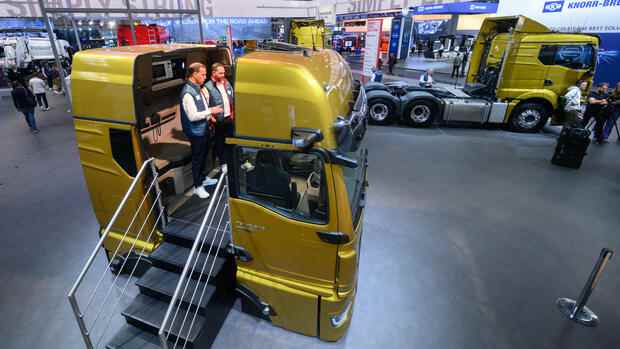The commercial vehicle business is gaining in importance for the German supplier giants.
(Photo: dpa)
Hanover Bosch now sees itself as the world’s largest automotive supplier for commercial vehicles – and is well ahead of ZF. The Bosch mobility division has so far increased sales by six percent after adjusting for exchange rate effects, explained the division head responsible, Markus Heyn, at the IAA Transportation in Hanover. “Every fourth euro is spent on technology for vans up to forty tons.” Last year, the largest division of the Bosch Group achieved sales of over 46 billion euros, around twelve billion of which should be attributable to commercial vehicles.
At the beginning of the year, the second largest German automotive supplier, ZF, claimed market leadership in the commercial vehicle business after taking over the brake manufacturer Wabco. At the time, joint sales in the truck business were estimated at just under 6.5 billion euros. If Heyn’s statements are correct, Bosch is likely to be well ahead, even if you exclude the light vans.
“ZF offers the broadest technology portfolio and the largest global presence,” countered ZF CEO Wilhelm Rehm in Hanover. Unlike Bosch, ZF also offers brakes and chassis parts.
Overall, the commercial vehicle business appears to be gaining in importance for both suppliers. “We expect a growth spurt for our business over the course of the decade thanks to alternative drive systems,” says Heyn.
Top jobs of the day
Find the best jobs now and
be notified by email.
The two major automotive suppliers are therefore not only researching battery-powered electric vehicles, which play a particularly important role in passenger cars.
Diesel initially remains dominant
According to Bosch forecasts, by 2025 more than 80 percent of all commercial vehicles worldwide will still be powered by diesel engines. After that, the variety of drives will increase: by 2035, every second new commercial vehicle will be electrically driven – either battery-electric or hydrogen-based.
“Openness to technology makes sense, especially in commercial vehicles. Depending on the application, there will be more than one climate-neutral truck drive,” Heyn is convinced. Conversely, however, this also means that suppliers must continue to invest more in research and development if they want to be at the forefront of all four technologies: diesel, battery-electric, fuel cell and hydrogen engine.
The commercial vehicle business could play a bigger role in the future, says the head of Bosch Mobility Solutions.
At Bosch alone, 3,400 developers are working on the commercial vehicle drive of tomorrow. The supplier has already received 30 series orders from manufacturers for the battery-electric drive.
Because Bosch is pursuing big plans with the fuel cell: By 2025, the company wants to have more than 40,000 of its own fuel cell systems on the road. ZF counters this with a new, exciting cooperation with Freudenberg in the field of fuel cells.
>> Read about this: From hydrogen transporters to luxury trucks – the most important innovations of the IAA Transportation 2022
While heavy trucks draw their energy from fuel cells and an electric motor, Bosch also sees advantages for the hydrogen combustion engine in construction and agricultural machinery. Bosch intends to invest a total of one billion euros in fuel cell and hydrogen technology.
Self-driving systems, intelligent services
But the commercial vehicle business is also becoming more important for automotive suppliers for another reason. “Automated driving is coming, driven in part by the acute shortage of drivers. Nowhere else does it make more economic sense than in commercial vehicles,” said Heyn. Experts also agree that the expensive systems will find their way into commercial trucks sooner than into cars.
In addition, legal regulations force the business. The turning assistant will be mandatory in Europe from 2024. In 2025, Bosch wants to go into series production at a European truck manufacturer with a central vehicle computer that enables the processing of sensor data in real time. ZF seems to be one step ahead: With its central computer ProAI, the foundation group from Lake Constance is planning to enter the market with Chinese and American customers two years earlier in 2023.
Bosch wants to develop hydrogen in logistics as an alternative to diesel.
The major suppliers are also pursuing different strategies when it comes to intelligent logistics services in fleet management: ZF offers the new fleet orchestration platform “Scalar” with artificial intelligence. “We’re getting a lot of interest from customers,” says ZF.
Bosch, on the other hand, is pursuing an open approach and not only bundling its own services in the Amazon cloud, but also those of third-party providers. It is still unclear who will come out on top in the large number of systems worldwide.
More: Bosch buys vans and equips them with fuel cells
